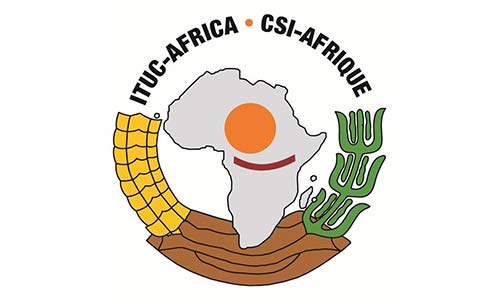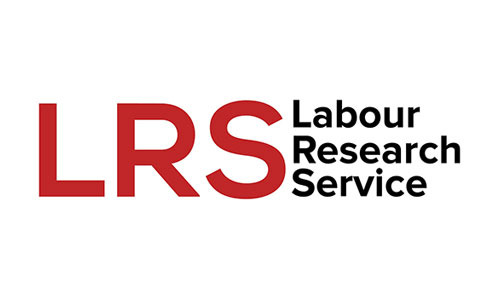Practical recommendations to strengthen trade union influence and engagement with the AfCFTA protocol on trade in services.
The African Continental Free Trade Area (AfCFTA) Protocol on Trade in Services seeks to liberalise services trade on the continent, offering prospects for increased investment, job creation, and improved service delivery. However, without robust safeguards, liberalisation of services trade could result in adverse outcomes for the continent’s workers and their trade unions such as job insecurity, deterioration in working conditions, and weakened labour rights. Averting these unintended consequences calls for trade unions to proactively engage with national and regional duty-bearers around the Trade in Services Protocol. To support such engagement, the Labour Research Service developed a Guide to the AfCFTA Protocol on Trade in Services, which simplifies the protocol and offers practical ways for trade unions to ensure that services trade leads to decent work in Africa.
Significance of trade in services in Africa
The Guide to the AfCFTA Protocol on Trade in Services highlights the significance of the services sector in Africa. Services account for about 54% of the Gross Domestic Product (GDP) and 75% of foreign business investment on the continent. Beyond these figures, the sector also supports the growth of productive and labour-intensive industries such as agriculture and manufacturing. The services sector is a major source of employment for women and young people, highlighting its potential to drive inclusive economic participation and social transformation across the continent.
Nonetheless, intra-African trade in services is limited. It accounts for 22% of trade within the continent and only 2% of global services trade. Moreover, trade in services in Africa is unevenly distributed, with Southern and Eastern Africa accounting for the majority. Another challenge lies in the composition of Africa’s service exports, which are predominantly concentrated in two lower-skilled sectors, transport and tourism. This narrow focus restricts the continent’s ability to diversify, move up the value chain, and generate high-quality, inclusive employment opportunities.

Source: Trade Unions and Trade: A Guide to the AfCFTA Protocol on Trade in Services, LRS
Modes of trade in services
The Guide to the AfCFTA Protocol on Trade in Services outlines four key modes through which trade in services takes place:
- Cross-border supply: This occurs when a service is delivered from one country to another without the movement of people. Both the service provider and consumer remain in their respective countries. Common examples include telecommunications, online services, and postal delivery.
- Consumption abroad: This mode involves consumers or firms travelling to another country to use a service. Typical examples include tourism, healthcare services, and international education.
- Commercial presence: Here, a service provider establishes a business or professional presence in another country to deliver services, such as when banks, retail chains, or hotels from one country set up branches in another.
- Movement of natural persons: This refers to individuals travelling to another country to provide services temporarily, such as skilled workers, consultants, or professionals.
It is important to note that prior to the AfCFTA, these modes of service trade in Africa were governed by national laws and regional protocols set by the various RECs. Such a fragmented approach often posed barriers to service trade, making it difficult to fully harness its potential across the continent.
Aims and scope of the protocol on trade in services
The Guide to the AfCFTA Protocol on Trade in Services outlines the aims of the Protocol, which seeks to establish a harmonised regulatory environment for trade in services across Africa. Its core objectives are 1) to progressively liberalise trade in services across Africa, 2) to accelerate industrial development and support the creation of regional value chains, and 3) to enhance the competitiveness of services through economies of scale and better coordination. To achieve these goals, the Protocol prioritises liberalisation and commitments in five key service sectors:
- Financial services – insurance, banking, and other financial services essential for investment and business growth).
- Business services – professional services (e.g., legal, accounting), ICT services, research and development, real estate, and leasing services.
- Communication services – postal, courier, telecommunications, and audio-visual services.
- Transport services – maritime, air, rail, road, and pipeline transport, as well as supporting services. Effective transport infrastructure is key to reducing trade costs and connecting markets.
- Tourism services – hotels, catering, travel agencies, tour operators, and tourist guide services—sectors with high potential for employment and youth entrepreneurship.
The Guide to the AfCFTA Protocol on Trade in Services highlights the important rules that AfCFTA Member States must observe. These rules shape how services are to be traded across borders. They include the Most-Favoured-Nation (MFN) Clause, which requires that whichever regulations apply to the ‘most favoured nation’ must now apply to all signatories of the agreement. There is the Special and Differential Treatment (SDT) Clause that allows some exceptions to the MFN because of the uneven development and capacities among African countries. Such exceptions include longer time periods for implementing the agreement and measures to encourage trade in least developed countries (LDCs). The Transparency Clause requires that State Parties disclose all policies, regulations, and measures that affect trade in services. This includes trade requirements, taxes, barriers to market entry, and legal protections.
Why the protocol on trade in services matters for workers and trade unions
While the rules outlined in the Protocol aim to facilitate regional trade and investment, they also pose significant risks to labour markets. These include increased outsourcing and growing job insecurity. Businesses may relocate operations to countries with weaker labour laws, fewer worker protections, or lower wage expectations, potentially creating a ‘race to the bottom’. Additionally, the Protocol could contribute to human capital flight, as skilled professionals such as doctors, engineers, and IT specialists migrate to wealthier African countries in search of better opportunities. This movement risks depriving less-developed economies of critical expertise needed for local development.
Implementation of the Protocol on Trade in Services involves successive rounds of negotiations between member states. Trade Unions have an opportunity to identify the parties responsible for these negotiations within their specific country, engage these parties to better understand the process, raise concerns, and advocate for the rights of labour.
Key recommendations
In light of these challenges, the Guide to the AfCFTA Protocol on Trade in Services serves as an important tool for trade unions. It identifies five key strategies that unions can adopt to mitigate the potential negative employment impacts of the Protocol:
- Advocacy for decent work in the services sector – The first recommendation is for trade unions to advocate for decent work in services trade. This requires analysing the Services Trade Restrictiveness Index (STRI), the regulatory database used to identify and catalogue barriers to international trade in services, to pinpoint indices related to employment protection. Trade unions can then campaign for regulatory reforms that strengthen workers’ rights.
- Monitoring implementation and negotiations – The second recommendation encourages trade unions to actively monitor the implementation of the Protocol and participate in successive rounds of negotiations. This proactive engagement will enable unions to conduct informed advocacy aimed at protecting and advancing workers’ rights and interests.
- Building local and regional alliances – Thirdly, the Guide urges trade unions to forge local and regional alliances. Such collaboration is essential for identifying and advocating for policies that uphold labour rights. In particular, the Guide encourages revitalising and deepening sub-regional cooperation, especially through existing networks within the Regional Economic Communities (RECs). By working together, trade unions can adopt a more proactive and unified approach to campaigns.
- Raising awareness among workers in key sectors – The guide calls on trade unions to raise awareness among workers in key service sectors such as business services, communications, transport, and tourism, that are likely to be most affected by the Protocol. Trade unions must educate workers about potential challenges, especially about employment conditions and the protection of their rights.
- Developing monitoring capacity – The guide recommends that trade unions build their capacity to monitor the Protocol’s impact on economic growth and employment. Doing so would provide empirical insights into how benefits are distributed, and which countries or sectors might face adverse effects. Such data is essential for trade unions seeking to effectively promote and safeguard the rights of workers engaged in the services trade.
The Guide to the AfCFTA Protocol on Trade in Services is a valuable addition to the repertoire of tools developed by LRS to support trade union advocacy on trade and the AfCFTA. It simplifies the provisions of the Protocol on Trade in Services, highlighting the four modes of services trade, the relevant rules, and the service sectors likely to be most affected by the Protocol. Importantly, the Guide underscores the significant implications of the Protocol for employment and labour rights. It calls on trade unions to advocate for decent work in services trade, to monitor the Protocol’s implementation, and to build alliances that ensure its implementation does not undermine workers’ rights.
Trade Unions and Trade: A Guide to the AfCFTA Protocol on Trade in Services
RELATED RESOURCES
- Trade Unions and Trade: A Guide to the AfCFTA Protocol on Goods
- Trade Unions and Trade: A Guide to the African Continental Free Trade Agreement
Dr Prince Asafu‐Adjaye
Prince Asafu‐Adjaye is an Associate at the Labour Research Service with a PhD in Development Studies and a background in Applied Labour Economics and Sociology. His doctoral research focused on trade union responses to neoliberalism in Ghana. With 15 years of experience in trade union research and policy at the Trades Union Congress (Ghana), his interests include labour markets, labour market institutions, and industrial relations.






